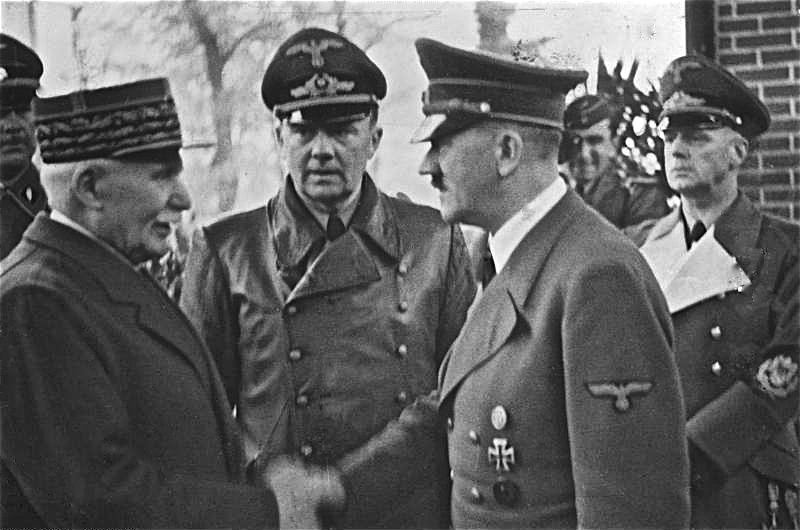The landslide defeat of Le Pen today is historically a big thing for France—it is perhaps the most decisive defeat that the peculiarly French form of the far right has suffered since World War 2. The electorate, presented with the movement’s most presentable package ever, utterly rejected it. This doesn’t mean it is going away. It never has gone away. Yet it was only actually in power once, during the Vichy years, 1940-44. Nowhere was the Nazi consolidation of their conquest easier than in France, where perhaps a third of the populace were pre-disposed to a fascist government already and where the Nazi occupiers found no shortage of talented civil servants to operate the French government and bureaucracy for them. The French took care of collecting victims of the Holocaust for the Germans, the French collected and shipped their own citizens off to work in German factories, the French even had their own Gestapo. It was as if there had been a fascist infrastructure sitting there in France awaiting a fascist takeover. Whether that takeover came from inside or outside (i.e., from Germany) was no matter to the French right. When France’s greatest living military hero, Philippe Petain, who’d saved the French Army from mutiny and collapse in 1917 and eventually led them in victory through Berlin a year later, agreed to lead France under Nazi domination it just signalled how profoundly fascist the nation had become. Perhaps half the county felt it their patriotic duty to follow Petain. Perhaps more. A little known factoid from the war is that most of the French soldiers rescued at Dunkirk as the Blitzkrieg closed in demanded to be returned after the French surrender to France to finish their service in the Vichy army. That Vichy was a fascist puppet state did not bother them. France was now allied with Nazi Germany and Germany was at war with England. Serving in the Free French forces under De Gaulle was seen by many and perhaps most French soldiers in 1940 as being unpatriotic. That changed as Nazi repression grew worse and Nazi demands for French manpower increased and as Nazi armies were defeated on battlefields. But in 1940 it was obvious that fascism had dug deep roots in the French national psyche. No other state the Nazis conquered rolled over as did France. No other subject people collaborated so. Reading the histories of those days is surreal. France had been enemies to the death with Germany in World War One. They died in unbelievable numbers defending France. Not now. The spirit of fascism had transformed the land in the years between the wars. Not everyone was a fascist, of course, but enough were to make it very uncomfortable for those who were not.
Apparently that spirit remains. It just wasn’t quite sure how widespread it is. We now know. About a third of the French electorate has fascist tendencies. Some of that third are powerfully fascist, some just ornery nationalist. Which is about what it was in the 1930’s. Things haven’t fundamentally changed at all. Perhaps the left’s retribution after liberation in 1944 had not been ferocious enough. Perhaps they should have hanged Petain, and shot tens of thousands more. Perhaps they should have thrown a million collaborators in re-education camps. Perhaps there should have been a purge worthy of the darkest days of the French Revolution. But they were a democracy. And democracies don’t do that sort of thing. Besides, that is what Vichy had been doing. They were the ones killing and torturing and exacting brutal revenge on political enemies for four long years. No one wanted to go through that again.
Which might be what doomed Le Pen’s party to defeat. No one wanted to go through life under a far right government again. The French right had power only once, from 1940-44, and only because an anti-democratic foreign regime forced itself upon it. Without Nazi Germany there never would have been a fascist government in France. And now in lieu of Hitler it was Putin trying to put the French hard right in charge. A lot of bad memories came rushing back, you could see it in the French press. A lot of talk about Vichy, and Petain, and how the French Right had once sold out the French people for the sake of its brutal ideology. And then all the talk of an aggressive foreign dictator–Putin–interfering in French domestic politics, again, just like the 1930’s, when German Nazis and French fascists were very close. Not that Le Pen and her platform were anything even close to Naziism, but it sure smelled funny. And familiar. Like those odd smells that suddenly bring back the past in powerful deja vu. It was all too much, and today the French voters kicked the French right to the curb. The threat is over for now.
Not that the French far right’s struggle is over. It is never over. In France the next Revolution is always just around the bend (there have been five Republics since the Revolution, and perhaps twice that many regime changes). You can dream big dreams in France, because politically just about anything seems within the realm of possibility. Le Pen’s party will retreat and reform, as there is always fertile ground in France for this fierce Francophile nationalism (remember how it once conquered Europe), and at the same time elements of the far right might well grow more radical, getting violent and militant and perhaps even paramilitary. None of this is new. It was a powerful far right/fascist coalition that did so much to weaken the French Third Republic as Nazi Germany grew into a mortal threat in the 1930’s. Of course back then the French Far Left, with some elements following orders from Stalin, was the right’s foil, and Left and Right battled in the streets even as both undermined the center. During the Vichy regime those street battles took on a much more vicious nature as the left formed the core of the French Resistance (the Maquis) and the right became the parts of the Gestapo’s police state (the Milice). Now that French hard Left and even its softer Left is pretty much spent (for now, anyway) as a political force, only anti-semitic fascism remains as a mass movement, deeply rooted radical ideology in France. That is what made Le Pen’s campaign so unsettling, that unlike Trump she did not come out of nowhere but was the leader of a generations old political party that represented at least a century and a half of French ideological history. German fascism had shallower roots in 1933, yet swept the country after a couple electoral victories. Were we seeing a repeat of that success in France?
Nope. Liberté, égalité, fraternité, more or less, came though.

Maréchal Pétain meets Adolf Hitler in October 1940. As low a point as there ever was in French history, it is also the high water mark of the French far right’s political power. You’d be hard pressed to find an entire political movement that ever betrayed its own country in such abject humiliation as did French conservatives after the French surrender in 1940. Not even Lenin turned his entire country over to the Germans in 1918 in the Treaty of Brest-Litovsk. Hitler left the French with no pride whatsoever, and the French Right had no problem with the set up at all. Thus Marine Le Pen licking Putin’s jackboots was nothing new to those aware of the history of French fascism.

Great history lesson, ‘Brick’! I didn’t know that factoid about the French soldiers at Dunquerque. I did know that the allies had to defeat the French navy before landing in North Africa. By the way there was a French professor at my college that was a member of the Vichy government. There was also another French professor at the same school who volunteered for the Free French and served as De Gaulle’s Secretary. I don’t know how the two of them got along.
LikeLike